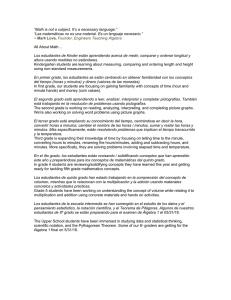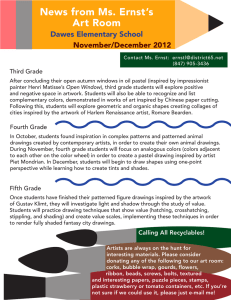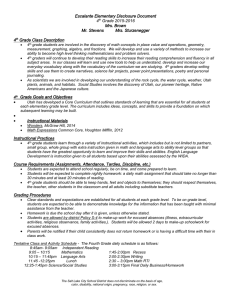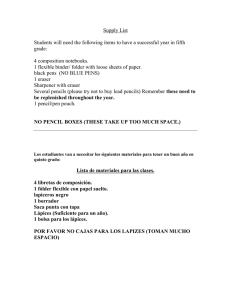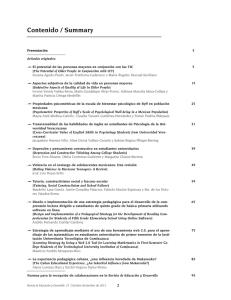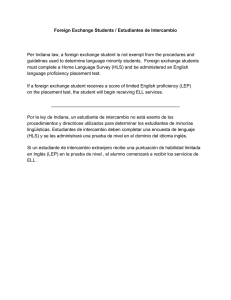The following syllabus is preliminary and subject to change
Anuncio
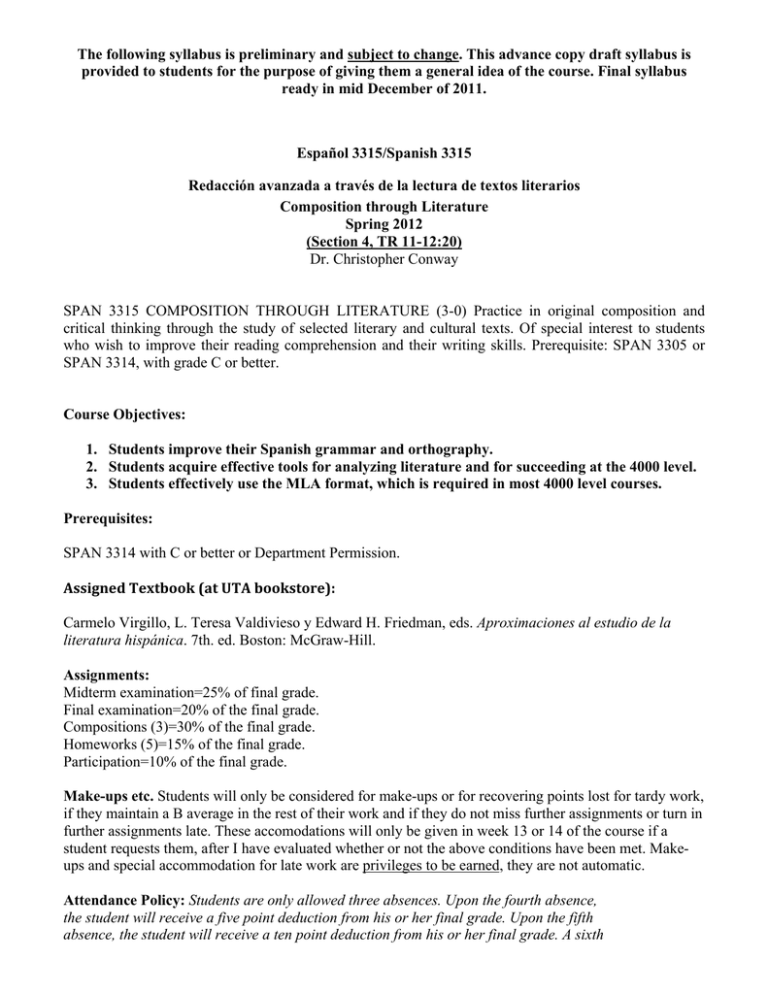
The following syllabus is preliminary and subject to change. This advance copy draft syllabus is provided to students for the purpose of giving them a general idea of the course. Final syllabus ready in mid December of 2011. Español 3315/Spanish 3315 Redacción avanzada a través de la lectura de textos literarios Composition through Literature Spring 2012 (Section 4, TR 11-12:20) Dr. Christopher Conway SPAN 3315 COMPOSITION THROUGH LITERATURE (3-0) Practice in original composition and critical thinking through the study of selected literary and cultural texts. Of special interest to students who wish to improve their reading comprehension and their writing skills. Prerequisite: SPAN 3305 or SPAN 3314, with grade C or better. Course Objectives: 1. Students improve their Spanish grammar and orthography. 2. Students acquire effective tools for analyzing literature and for succeeding at the 4000 level. 3. Students effectively use the MLA format, which is required in most 4000 level courses. Prerequisites: SPAN 3314 with C or better or Department Permission. Assigned Textbook (at UTA bookstore): Carmelo Virgillo, L. Teresa Valdivieso y Edward H. Friedman, eds. Aproximaciones al estudio de la literatura hispánica. 7th. ed. Boston: McGraw-Hill. Assignments: Midterm examination=25% of final grade. Final examination=20% of the final grade. Compositions (3)=30% of the final grade. Homeworks (5)=15% of the final grade. Participation=10% of the final grade. Make-ups etc. Students will only be considered for make-ups or for recovering points lost for tardy work, if they maintain a B average in the rest of their work and if they do not miss further assignments or turn in further assignments late. These accomodations will only be given in week 13 or 14 of the course if a student requests them, after I have evaluated whether or not the above conditions have been met. Makeups and special accommodation for late work are privileges to be earned, they are not automatic. Attendance Policy: Students are only allowed three absences. Upon the fourth absence, the student will receive a five point deduction from his or her final grade. Upon the fifth absence, the student will receive a ten point deduction from his or her final grade. A sixth absence will trigger a fifteen point deduction from their final grade. Upon the seventh absence, the student will fail the class. Students who are regularly tardy will be called upon to meet with the professor. If tardiness becomes a recurring problem with certain individuals, the professor may assign attendance penalties in the form of counting each tardy as a half absence or a full absence, depending on how tardy the student is. DROP POLICY: Students shall follow University drop policy. It is the responsibility of the student to drop the class in a timely fashion, by the drop date of November 4. INCOMPLETE POLICY: Students must complete most of the course with at least a grade of B in order to be considered for an incomplete. ELECTRONIC COMMUNICATION POLICY: (1) Students are responsible for regularly checking their UTA email address in the event of Blackboard outage or some such disaster. I will send all official message to your UTA email address. (2) Students should write their general course questions on the message board in Blackboard and not in a personal message to me. We want to learn from everybody’s questions, the way we do in a normal class. Use individual messages to me for the purpose of talking about something private, like a grade, or a personal problem. Everything else about the class and how it works and the content, must go on the Blackboard message board. GRADE GRIEVANCE POLICY: Students with questions about their grade should talk to me first. A face-to-face meeting is recommended. If, after this meeting, a student is not satisfied, he or she should speak to Dr. Sonia Kania, the Head of the Spanish Program in the Department of Modern Languages. If the student still wishes to complain, he or she then goes to the Department Chair, Dr. Antoinette Sol. IMPORTANT UNIVERSITY POLICIES: AMERICANS WITH DISABILITIES ACT: The University of Texas at Arlington is on record as being committed to both the spirit and letter of federal equal opportunity legislation; reference Public Law 92-112 - The Rehabilitation Act of 1973 as amended. With the passage of federal legislation entitled Americans with Disabilities Act (ADA), pursuant to section 504 of the Rehabilitation Act, there is renewed focus on providing this population with the same opportunities enjoyed by all citizens. As a faculty member, I am required by law to provide "reasonable accommodations" to students with disabilities, so as not to discriminate on the basis of that disability. Student responsibility primarily rests with informing faculty of their need for accommodation and in providing authorized documentation through designated administrative channels. Information regarding specific diagnostic criteria and policies for obtaining academic accommodations can be found at www.uta.edu/disability. Also, you may visit the Office for Students with Disabilities in room 102 of University Hall or call them at (817) 272-3364. ACADEMIC INTEGRITY: It is the philosophy of The University of Texas at Arlington that academic dishonesty is a completely unacceptable mode of conduct and will not be tolerated in any form. All persons involved in academic dishonesty will be disciplined in accordance with University regulations 2 and procedures. Discipline may include suspension or expulsion from the University.” Scholastic dishonesty includes but is not limited to cheating, plagiarism, collusion, the submission for credit of any work or materials that are attributable in whole or in part to another person, taking an examination for another person, any act designed to give unfair advantage to a student or the attempt to commit such acts." (Regents’ Rules and Regulations, Series 50101, Section 2.2) Please Note: Upon beginning this class and receiving this syllabus, the professor will expect students to understand (1) what plagiarism is and that (2) plagiarism is a form of academic dishonesty. Plagiarism is the copying of the words and arguments of another person, whether it be from a traditional print or from a web source, and presenting such material as one’s own work without attribution. Any student who does not understand what plagiarism is should contact me before commencing work on any written assignment. All students who commit plagiarism will be reported to the University for disciplinary action. STUDENT SUPPORT SERVICES: The University of Texas at Arlington supports a variety of student success programs to help you connect with the University and achieve academic success. These programs include learning assistance, developmental education, advising and mentoring, admission and transition, and federally funded programs. Students requiring assistance academically, personally, or socially should contact the Office of Student Success Programs at 817-272-6107 for more information and appropriate referrals. The following schedule of readings is only a sample and is subject to change. Final syllabus available on December 15. Distribución tentativa de las clases: [Instructor shall put in specific dates and page numbers in this document etc., and format assignments properly.] Semana 1: Del libro Aproximaciones: La literatura como arte y fenómeno estético; El autor y su obra…; Introducción a la narrativa; Panorama histórico y categorías fundamentales; El cuento: Guía general para el lector. Suplemento: Repaso de la acentuación. Semana 2 Del libro Aproximaciones: “Lo que sucedió a un mozo que casó con una muchacha de muy mal carácter” de Don Juan Manuel; “La camisa de Margarita” de Ricardo Palma; “Las medias rojas” de Emilia Pardo Bazán. Suplemento: Repaso de la acentuación. Entrega de Tarea 1: Comentario de texto (600 palabras) sobre la situación de la mujer en Don Juan Manuel o Ricardo Palma. 3 Se reparten las instrucciones para la Composición 1. La composición se enfocará en comparar dos de los cuentos asignados para la semana 2 (Juan Manuel, Ricardo Palma o Emilia Pardo Bazán) en función del tema de la mujer. Semana 3 Del libro Aproximaciones: “La noche boca arriba” de Julio Cortázar; “El etnógrafo” de Jorge Luis Borges; “No oyes ladrar los perros” de Juan Rulfo. Suplementos: Introducción y repaso del formato MLA. Repaso de la diferencia entre ser y estar. Entrega de Tarea 2: La tarea 2 es un cuestionario sobre la primera composición, en la que cada estudiante proporciona la tesis que quiere demostrar, así como los apuntes y las citas principales que comprueban la tesis propuesta. Ver anexo al final de este programa. Semana 4 Del libro Aproximaciones: “Pecado de omisión” de Ana María Matute; “El recado” de Elena Poniatowska; “La mujer del Juez” de Isabel Allende. Suplemento: Indicativo/subjuntivo. Entrega del borrador de la Composición 1. Semana 5 Del libro Aproximaciones: San Manuel Bueno Mártir Tarea 3: Habrá control de lectura sobre San Manuel Bueno Mártir. Devolución del borrador de la Composición 1. Semana 6 Del libro Aproximaciones: San Manuel Bueno Mártir. Entrega de la Composición 1. Semana 7 Del libro Aproximaciones: San Manuel Bueno Mártir. Suplemento: Indicativo/subjuntivo. Tarea 4: Comentario de texto sobre San Manuel Bueno Mártir. Semana 8 Examen. 4 Del libro Aproximaciones: Introducción al drama; Panorama histórico y categorías fundamentales; El drama: guía general para el lector. Semana 9 Del libro Aproximaciones: La casa de Bernarda Alba de Federico García Lorca. Suplemento: Pretérito/imperfecto. Se reparten instrucciones para la Composición 2. Semana 10 Del libro Aproximaciones: La casa de Bernarda Alba de Federico García Lorca. (Conclusión). Semana 11 Del libro Aproximaciones: Introducción al ensayo; Panorama histórico y categorías fundamentales; El ensayo: Guía general para el lector. Entrega de la Composición 2. Suplemento: Usos de haber en los tiempos compuestos. Semana 12 Del libro Aproximaciones: “Los obreros y yo” de Eva Perón; “Y las madres, ¿qué opinan?” de Rosario Castellanos; “La autenticidad de la mujer en el arte” de Rosario Ferré. Entrega de Tarea 5: Comentario de texto (600 palabras) sobre La casa de Bernarda Alba. Se reparten instrucciones para la Composición 3. Suplemento: Usos de haber en los tiempos compuestos. Semana 13 Del libro Aproximaciones: Introducción a la poesía; El lenguaje literario; Panorama histórico y categorías fundamentales. Suplemento: Usos de “Se”. Semana 14 Del libro Aproximaciones: “Soneto I” y “Soneto XXIII” de Garcilaso de la Vega; “Llama de amor viva” de San Juan de la Cruz; “Soneto CLXVII” de Luis de Góngora; “Salmo XVII” de Francisco de Quevedo. Entrega de la Composición 3. Suplemento: Usos de “Se”. 5 Semana 15 Del libro Aproximaciones: “El cisne” de Rubén Darío; “El momento más grave de la vida” y “Yuntas” de César Vallejo; Poema “XXIX” de Proverbios y cantares de Antonio Machado. Repaso para el examen final. Examen Final. 6 SPAN 3315 Nombre: ____________________________ Anteproyecto para la Composición 1. Aviso al estudiante: Cuando se escribe crítica literaria se tiene que proceder por partes y trabajar por adelantado. Para tales efectos, es necesario planificar y dividir las labores intelectuales en partes. Hay varios pasos previos que se recomiendan a fin de escribir una buena composición para esta clase y para otras de nivel 4000. En esta hoja se apuntarán las respuestas a tres preguntas preliminares y, en el proceso, se mejorarán el borrador y la versión final de la composición que se entregará más adelante. Por último, se escribirán las respuestas a máquina y se consultará el modelo de este cuestionario que se ha incluido con esta hoja a manera de guía. ¿Cuál será la tesis que usará en esta primera composición? Recuerde que una tesis tiene que ser algo debatible, algo que se probará por medio del análisis, y no un resumen o un comentario superficial sobre el texto. [escriba su respuesta aquí] Proporcione por lo menos 4 citas del texto que piense comentar en su ensayo para verificar y respaldar su tesis. Las citas tienen que estar transcritas correctamente. Para cada cita, proporcione por lo menos un par de oraciones explicando la importancia o relevancia de estas citas. [escriba su respuesta aquí] Proporcione a continuación un esquema de su ensayo indicando el orden de sus argumentos, etc. [escriba su respuesta aquí en forma de bosquejo (outline)] 7
